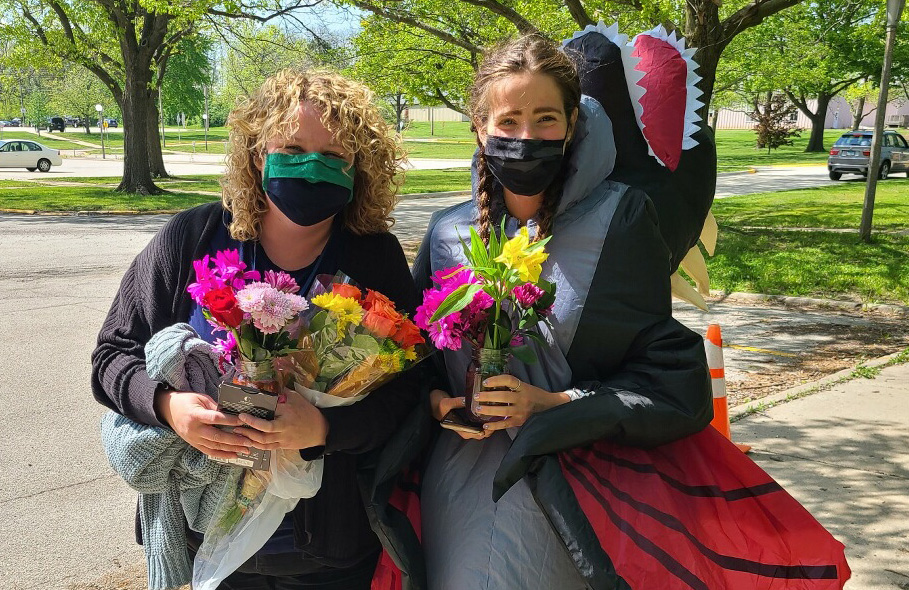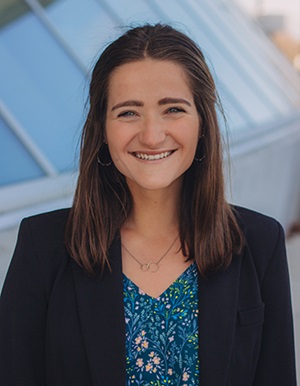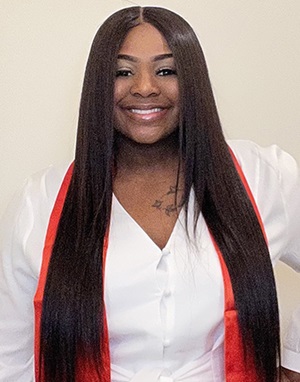Interns Teach and Foster Emotional Development During Pandemic
by Tom Hanlon / Jun 15, 2021

2021 Elementary Education graduate Emily Tyndorf (right), is dressed up in University Primary School's "Don't Be a Dragon" Friday costume on her last day of student teaching.
The best internships offer environments that challenge interns and help them grow in skills and confidence. Those challenges and growth were accelerated this spring by COVID-19 for two University of Illinois students interning at University Primary School.
Two students from the University of Illinois at Urbana-Champaign got a bit more than they bargained for when they interned at University Primary School this spring.
Thanks to COVID-19, the students walked out with an experience that helped prepare them in ways that an internship in more normal times might not have.
 “The biggest pro is I gained a lot of skills about being flexible in the classroom,” says Emily Tyndorf, who graduated with her bachelor’s degree in Elementary Education from the College of Education in May and who plans to go to Georgetown University in 2022 for a master’s degree in education policy after teaching for a year. “I always said I wasn’t a very flexible person, but this year changed that!”
“The biggest pro is I gained a lot of skills about being flexible in the classroom,” says Emily Tyndorf, who graduated with her bachelor’s degree in Elementary Education from the College of Education in May and who plans to go to Georgetown University in 2022 for a master’s degree in education policy after teaching for a year. “I always said I wasn’t a very flexible person, but this year changed that!”
Kristian Nelson just graduated with her bachelor’s in Social Work and will be starting her MSW at Illinois in the fall. “It was a cool experience for me to be able to support students remotely as well as in person,” Nelson says. “COVID benefited me in terms of being able to utilize technology in an efficient and effective way. Implementing that technology aspect while supporting others was important for me to learn, especially as the world is changing and technology is a big part of that change.”
 Tyndorf and Nelson both worked with grades 4 and 5 at University Primary School, which had about half its fourth and fifth grade students attending remotely and half in person (in the other grades, the remote learners’ numbers were smaller). Tyndorf co-taught, while Nelson carried out her social work internship under the tutelage of Uni Primary director Ali Lewis.
Tyndorf and Nelson both worked with grades 4 and 5 at University Primary School, which had about half its fourth and fifth grade students attending remotely and half in person (in the other grades, the remote learners’ numbers were smaller). Tyndorf co-taught, while Nelson carried out her social work internship under the tutelage of Uni Primary director Ali Lewis.
“Kristian led our fourth and fifth graders in a series of lessons about their inner and outer identities and self-expression,” Lewis says. “She created space for their big questions and dreams. She introduced terms like intersectionality—a complex concept for this age group to consider.”
Nelson faced plenty of challenges, some brought on by COVID, some not. On day one, she encountered a student having a difficult day, and her co-teacher didn’t want to throw Nelson into the fire, so to speak. But Lewis told the co-teacher that was why Nelson was there, and that the Illinois senior could handle it.
“I talked to the student about what was going on, what the issue was, what makes them happy, things like that,” Nelson recalls. “Their spirits were lifted, and I was happy and grateful to be a part of that.”
Tyndorf found it difficult at times to balance the remote and in-person teaching experiences. “I got used to it, but it was a bit overwhelming at first,” she says. “You had to transfer your lessons from an in-person format to an online format. Designing projects for both sets of students was tricky. It was a scheduling nightmare for teachers.”
Tending to the social-emotional needs of the children made the adjustment even trickier.
“Emily would be midstream in a literacy lesson and pivot to address a students' social-emotional need of frustration or joy. She took time to listen and help the children connect to content in meaningful ways from their lives,” Lewis says.
“I learned the skills of time management and multitasking while teaching on Zoom and managing a classroom,” Tyndorf says. “Anyone that taught or student taught this year will come out of this with a lot more skills, resilience, and new insights into their teaching. There were a lot of inequities and injustices in our education system that were revealed through COVID. A lot of kids don’t have access to Wi-Fi or to laptops. As a society we have learned a lot about how the education system has changed.”
Lewis agrees regarding the inequities. “The caretaking aspect of classroom work is greatly amplified by the pandemics of COVID and racism,” she says. “Children have more uncertainty in their day-to-day and heavy hearts, as citizens both globally and locally.”
The semester at Uni Primary, however, was positive for all involved.
“It was a hard year, but I think everyone, teachers and students alike, grew a lot. The kids showed a lot of resilience,” Tyndorf says.
Nelson echoes those sentiments. “I feel that I progressed as a person and as a future social worker,” she says. “I learned to accept people as they are and to learn their stories and come together in a way that you can help both them and you progress.”
Lewis greatly appreciates the mutually beneficial collaboration between Uni Primary and the University of Illinois in terms of student interns.
“These two Illinois students, working side by side, sometimes online and sometimes in-person, and most often across both environments, brought us a culmination and application of their learning at Illinois,” she says. “We wish them goodness in their futures!"
Note: Three other Illinois students also interned this spring at University Primary School: Jake Majernik (social work), and Lekesheonta Shelby and Taylor Turner, both as student teachers. Several other Illinois students also participated in practicums at Uni Primary.